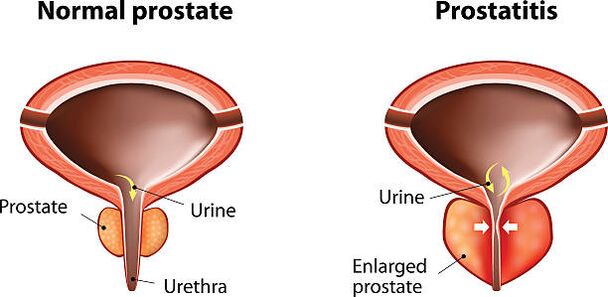Prostatitis is an inflammatory process that develops in the glandular tissue of the prostate, sometimes transitioning to the muscle part of this organ. This causes perineal pain, weakness, fatigue, urinary incontinence and sexual dysfunction. Treatment of acute prostatitis is essential to avoid dangerous complications of the disease.

At present, both the causes and processes of prostatitis are well known. Therefore, the urologist has a wide range of tools to treat this disease. They should only be prescribed by a specialist who is familiar with the relationships that a particular drug causes in the development of the disease and also takes into account their contraindications. Consider the main groups of drugs used to treat prostatitis.
Antibacterial agents
The most common cause of prostatitis is bacteria. Antibacterial drugs are directed against them.
In order to specifically induce the bacterium that caused prostatitis in a given person, a bacteriological examination should be performed on the secretions secreted by the prostate. Only after knowing the name of the microorganism, what properties does it have and what antibacterial agents is sensitive can you choose the right antibiotic. And modern drugs with a similar orientation can also cure severe forms of the disease. The following antibiotics are used in acute bacterial prostatitis:
- Amoxicillin;
- Ceftriaxone;
- Cefotaxime;
- Ofloxacin;
- Ciprofloxacin;
- Azithromycin.
This is not a complete list of antibacterial drugs used to treat prostatitis.
Antiviral treatment
If prostatitis has an etiology of herpes, it is treated with antiviral drugs. It:
- Aciclovir;
- Valciclovir;
- Ffamciclovir.
The latter drug is the "gold standard" in the treatment of viral prostatitis.
Non-steroidal anti-inflammatory drugs
Medications such as diclofenac, indomethacin, ketoprofen, or ketorolac are needed not so much to relieve the pain associated with the disease, but to reduce the swelling and inflammation of the gland. They also contribute to the appearance in the blood of substances that facilitate the onset of poisoning and reduce elevated body temperature.
The optimal drug to fight inflammation, Diclofenac, also eliminates pain syndrome very well. If the pain is particularly severe and sharp, Ketorolac is used.
Medications that eliminate cramps
In the treatment of prostatitis, drugs are used that act on different spasms of the pelvic and prostate muscles. This allows you to improve your urination and helps the previous group of medications relieve the pain. So here it is applied:
- Drotaverine: acts on smooth muscles, making the reaction that results in muscle cramps impossible;
- Baclofen: reduces the sensitivity of the nerve fibers in the prostate and toxic organs;
- Tamsulosin: acts only on receptors in the muscles of the bladder and prostate.
Complementary medicines
The following medications are good supplements for the treatment of prostatitis:
- Prostate extract: the drug protects prostate cells from damage during inflammation, improves microcirculation, eliminates congestion in the vessels of the pelvis and strengthens blood vessels. All of these effects are extremely beneficial in chronic prostatitis. Animal, not chemical origin does not cause side effects. It can be used in the form of injections or suppositories.
- Palm creeping fruit extract. It is an anti-inflammatory herb. It regulates the amount and strength of urination and reduces the unpleasant symptoms of going to the toilet.
- It is a food bioactive supplement containing a complex of proteins and nucleoproteins isolated from the bovine prostate gland, which affects the metabolism of the prostate, normalizes its work and, accordingly, urine.
























